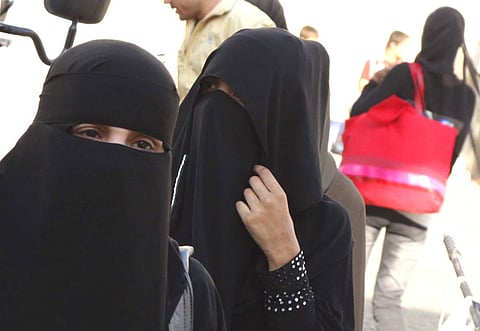Syria bans full Islamic face veils in universities
Syria has forbidden its students and teachers from wearing the niqab in universities

Damascus: Syria has forbidden the country's students and teachers from wearing the niqab, the full Islamic veil that reveals only a woman's eyes, targeting a garment in move many see as political.
The ban shows a rare point of agreement between Syria's secular, authoritarian government and the democracies of Europe. Both view the niqab as a potentially destabilising threat.
"We have given directives to all universities to ban niqab-wearing women from registering," a government official in Damascus said on Monday.
The order affects both public and private universities and aims to protect Syria's secular identity, said the official. Hundreds of primary school teachers, who were wearing the niqab at government-run schools, were, last month, transferred to administrative jobs, he added.
The ban, issued on Sunday by the Education Ministry, does not affect the hijab, or headscarf, which is far more common in Syria than the niqab's billowing black robes.
Syria is the latest in a string of nations, from Europe to the Middle East, to weigh in on the veil, perhaps the most visible symbol of conservative Islam.
The wearing of veils has spread in other secular-leaning Arab countries, such as Egypt, Jordan and Lebanon, with Jordan's government trying to discourage women from wearing it by playing up reports of robbers who wear veils as masks. Turkey bans Muslim headscarves in universities, with many saying attempts to allow them in schools amount to an attack on modern Turkey's secular laws.
The issue has, in recent months, been debated across Europe, with France, Spain, Belgium and the Netherlands are considering banning the niqab on the grounds that it’s degrading to women.
Last week, France's lower house of parliament overwhelmingly approved a ban on both the niqab and the burqa, which covers even a woman's eyes, in an effort to define and protect French values - a move that has angered many in the country's Muslim community.
The measure goes before the Senate in September and its biggest hurdle could come when it comes under the scrutiny of France's constitutional watchdog at a later stage. A controversial 2004 law in France earlier prohibited Muslim headscarves and other ‘ostentatious’ religious symbols in the classrooms of French primary and secondary public schools.
Opponents, however, say such a ban violates freedom of religion and personal choice, and will stigmatise all Muslims.
In Damascus, a 19-year-old university student, who would only give her first name, Duaa, said she hopes to continue wearing her niqab to classes when the next term begins in the autumn, despite the ban.
Otherwise, she said, she will not be able to study. "The niqab is a religious obligation," said the young woman.” I cannot go without it."
Nadia, a 44-year-old science teacher in Damascus, who was reassigned last month because of her veil, said: "Wearing my niqab is a personal decision. It reflects my freedom”. She also declined to give her full name.
In European countries, particularly in France, the debate has turned to questions of how to integrate immigrants and balance a minority's rights with secular opinion that the garb is an affront to women.
But in the Middle East, particularly in Syria and Egypt, where there have been efforts to ban the niqab in the dorms of public universities, experts say the issue underscores the distance.
Sign up for the Daily Briefing
Get the latest news and updates straight to your inbox



